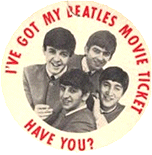
In 1962 Capitol Records in America were still refusing to issue Beatles products. Noel Rodgers, the British representative for United Artists Records, was witnessing Beatlemania first-hand in London and was convinced that it would inevitably reach the States. He approached Bud Ornstein, the British production head of United Artists film division, with the suggestion that they offer The Beatles a three-picture deal in order to obtain three Beatles soundtracks. They were both primarily interested in obtaining The Beatles on record for UA and didn’t initially realise how big the films would be. Because of this they opted for a cheap budget and approached Walter Shenson, who’d been making low-budget films in Britain, asking him to produce. Shenson chose Dick Lester as his director.
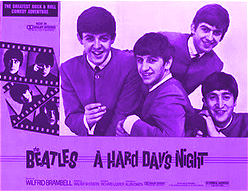
When the meeting to discuss the deal was arranged with Brian Epstein, Ornstein and Shenson had agreed that they would be prepared to give The Beatles 25% of the net profits, together with a flat fee of £20,000. They were surprised when Epstein said, immediately, “I should warn you now. I’m not prepared to settle for less than 7.5%". Fortunately, due to The Beatles' continuing success, Ornstein voluntarily increased the share to 20% and their flat fee to £25,000.
In an interview, Shenson commented, “Now I’ve got The Beatles, do I need stars? Are they necessary, even playing bit parts? My guess is, no. It would be all wrong to have, say, Kenny More or Dirk Bogarde appearing with the boys, though maybe not Margaret Rutherford. I have a hunch the fans would love her. But say, just say, It was Hayley Mills - will they feel resentment of her?”.
A teenage daughter of a friend said to him, “Oh Mr Shenson, I’m just praying there’ll be no love interest in your Beatles film!”. He took the girls advice and decided not to include any romances for The Beatles. He also eschewed big name stars, giving the largest non-Beatles role to Wilfred Brambell, known for his leading role in the BBC TV sit-com ‘Steptoe and Son'.
Others in the cast included Liverpudlian actor Norman Rossington as Norm, the group’s road manager. Another Liverpool-born actor was Deryck Guyler, who portrayed a police sergeant. Actor John Junkin portrayed the group’s second road manager, Shake, and Kenneth Haigh, who played the part of Simon, an advertising executive, didn’t want his name in the film’s credits. Shenson explained, “He’s a Shakespearian actor and, like a lot of established people back then, he didn’t want to be associated with The Beatles. He got a lot of money for one day’s work and we agreed not to use his name. But he later listed ‘A Hard Day’s Night’ in his credits wherever he went”.
In an interview, Shenson commented, “Now I’ve got The Beatles, do I need stars? Are they necessary, even playing bit parts? My guess is, no. It would be all wrong to have, say, Kenny More or Dirk Bogarde appearing with the boys, though maybe not Margaret Rutherford. I have a hunch the fans would love her. But say, just say, It was Hayley Mills - will they feel resentment of her?”.
A teenage daughter of a friend said to him, “Oh Mr Shenson, I’m just praying there’ll be no love interest in your Beatles film!”. He took the girls advice and decided not to include any romances for The Beatles. He also eschewed big name stars, giving the largest non-Beatles role to Wilfred Brambell, known for his leading role in the BBC TV sit-com ‘Steptoe and Son'.
Others in the cast included Liverpudlian actor Norman Rossington as Norm, the group’s road manager. Another Liverpool-born actor was Deryck Guyler, who portrayed a police sergeant. Actor John Junkin portrayed the group’s second road manager, Shake, and Kenneth Haigh, who played the part of Simon, an advertising executive, didn’t want his name in the film’s credits. Shenson explained, “He’s a Shakespearian actor and, like a lot of established people back then, he didn’t want to be associated with The Beatles. He got a lot of money for one day’s work and we agreed not to use his name. But he later listed ‘A Hard Day’s Night’ in his credits wherever he went”.
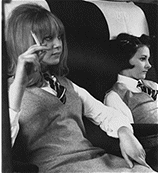
Victor Spinetti was cast as a manic television director and he was to appear in further Beatles projects. Anna Quayle appeared as Millie and a touch of glamour was added with the casting of ex-Miss World, Rosemarie Frankland, as a showgirl. George Harrison had always felt slightly awed by the talent of John and Paul and, added to the fact that he was the youngest member of the group, had tended to remain in the background at interviews; yet he proved to be a natural actor. Shenson said: “George came along well with his acting, so I asked the writer for another short scene for him because I liked his ‘shirt scene’. The writer came up with the ‘shaving scene’. The art director put a bath tub in, so I said to the director ‘Why don’t we put John in the bath?’. He didn’t have any dialogue, but the scene became John’s instead of George’s”. George also met his future wife on the set. There were four schoolgirls featured in an early scene: Pattie Boyd, Tina Williams, Pru Bury and Susan Whitman. Pattie was a model who had appeared in a series of Smiths Crisps TV ads directed by Dick Lester, who hired her for The Beatles’ movie. George seemed enchanted by her from the moment he met her and a real-life romance began which more than made up for the one aspect the movie noticeably lacked.
“We knew it was better than other rock movies” - John Lennon
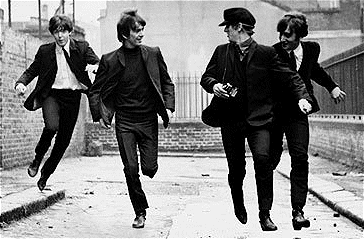
| The film was budgeted at £200,000, the production company was Proscenium Films and Shenson’s assistant was Dennis O’Dell. It was decided to film in black and white and Robert Freeman, the group’s photographer friend, was hired to create the title sequence, while George Martin was appointed musical director. He provided instrumental versions of ‘This Boy’, ‘I Should Have Known Better’, ‘And I Love Her’ and ‘A Hard Day’s Night.’ The official announcement about the making of the film was given in December 1963. Shooting began on 2nd March 1964 and lasted for two months. Twickenham Studios, Middlesex, was the setting for the interior scenes and location shooting took place at several sites in the London area. The Beatles are shown at Marylebone Station at the beginning of the film where they are pursued by hordes of fans, causing them to make an ingenious escape by dodging through the doors of taxis. St Margaret’s Field in Gatwick was used for the scene in which they engage in a bit of horseplay during a break in rehearsals for their TV show. It was also where the final scene – in which the boys are picked up by a helicopter – was filmed. |
The Scala Theatre in Charlotte Street, London, was the setting for their performance before an audience on the television show. (In fact the group actually performed to rows of empty seats. The audience was admitted after the group had left the theatre and did all their screaming to a film of The Beatles’ performance).
The street scenes and police station sequences were filmed in Clarendon Road in Notting Hill Gate.
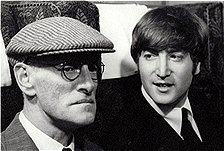
The train sequences were filmed over six days, mainly on the route between London and Minehead; during this period the cast and crew travelled approximately 2,500 miles by train. The scenes of Ringo by himself were filmed in Kew and the pub scene was shot in an actual pub near Twickenham Studios where most of the movie was filmed. The guards-van scene in which the Beatles perform ‘I Should Have Known Better’ in front of four schoolgirls, was filmed in the studios, among crates of live chickens. It had been suggested at one time that the chickens should be let loose during the sequence, but it was felt that they might end up stealing the scene!
Among the many suggestions for a title were: ‘What Little Old Man?’, this was one of the first sentences uttered in the film; ‘Beatlemania’, a term which, by then, was gaining widespread usage; ‘On The Move; ‘It’s a Daft, Daft, Daft, Daft, Daft World’; ‘Travelling On’; ‘ Moving On’ and ‘Let’s Go.’ Reports at the time all claimed that the title ‘A Hard Day’s Night’ had come from Ringo. Beatles Monthly, for instance, claimed: “Ringo hit on ‘A Hard Day’s Night.’ Earlier, he’d been asked if he’d had a haircut and said, “No, it’s the same difference.” He often comes out with strangely worded quotes. And after a long day’s work, as the hands of the clock reached into the early hours, he said casually, ‘Boy, this had been a hard day’s night’”.
Walter Shenson also credited Ringo as the person who thought up the title. However, in John Lennon’s first book ‘In His Own Write’, published on 23rd March 1964, there is a story called ‘Sad Michael’ in which John wrote: “He’d had a hard day’s night that day, for Michael was a Cocky Watchtower”.
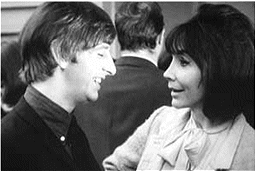
The scriptwriter was Alun Owen and although he had tried to ensure that all four received an equal share of the action, it was Ringo’s role which seemed to catch the critics’ attention. George also had an interesting scene in an advertising agency. A sequence featuring Paul was cut from the finished film - he had appeared with Isla Blair, who was dressed as a Shakespearean actress, but it ended up on the cutting room floor because it was felt that Paul had been too self-conscious.
The scene occurred following George’s adventure in the advertising agency and his confrontation with the teenage model Susan Campey. Paul has set out in search of Ringo who has managed to get himself lost. Paul wanders around the Notting Hill area, coming across an old church hall that sports a sign ‘TV Rehearsal Room.’ A group of figures dressed in costume emerge and pass him. He enters and notices a girl moving about the huge room. She is dressed in theatrical costume and is quoting Shakespeare. After some moments, the girl notices Paul and pauses in her speech. He asks her to continue but she tells him to go away as he’s spoiled her solitary rehearsal. He remains and begins to chat with her, although she tells him he’ll be thrown out when the others return.
The scene occurred following George’s adventure in the advertising agency and his confrontation with the teenage model Susan Campey. Paul has set out in search of Ringo who has managed to get himself lost. Paul wanders around the Notting Hill area, coming across an old church hall that sports a sign ‘TV Rehearsal Room.’ A group of figures dressed in costume emerge and pass him. He enters and notices a girl moving about the huge room. She is dressed in theatrical costume and is quoting Shakespeare. After some moments, the girl notices Paul and pauses in her speech. He asks her to continue but she tells him to go away as he’s spoiled her solitary rehearsal. He remains and begins to chat with her, although she tells him he’ll be thrown out when the others return.
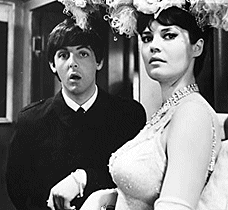
She guesses he’s from Liverpool and they then discuss acting, although Paul admits he’s only done Shakespeare in a school play. She tells him she likes acting for herself and he considers such an attitude to be selfish, telling her that actors and actresses should act for an audience. He tells her that he’d approach her part acting in the manner of a Liverpool scrubber. He points out that this is a clearer way of explaining the character of the role she has been rehearsing.
Paul has to utter such lines as: “I know your sort – two Cokes and a packet of cheese and onion crisps and suddenly it's love and we’re stopping in an empty street doorway. Gerrout of it! Ah, you’re lonely all right, you’re smashin’, but come round here and tell all that to me Mum – you won’t, will you? You’re just after me body and you can’t have it, so there!”, Paul remembers his mission to find Ringo and says his farewells.
As he leaves he hears the actress return to the rather artificial voice she’d been using which he’d first heard on her rehearsal. Then she pauses and begins again, using a much more naturalistic mode of speech, just as Paul had suggested.
Paul has to utter such lines as: “I know your sort – two Cokes and a packet of cheese and onion crisps and suddenly it's love and we’re stopping in an empty street doorway. Gerrout of it! Ah, you’re lonely all right, you’re smashin’, but come round here and tell all that to me Mum – you won’t, will you? You’re just after me body and you can’t have it, so there!”, Paul remembers his mission to find Ringo and says his farewells.
As he leaves he hears the actress return to the rather artificial voice she’d been using which he’d first heard on her rehearsal. Then she pauses and begins again, using a much more naturalistic mode of speech, just as Paul had suggested.
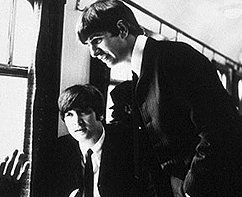
The official synopsis of the film read: Once upon a time there were four happy Liverpool lads called Paul, John, George and Ringo and they played their music all over the country. Now, when they’d finished playing in one place they’d run to the nearest railway station and go on to a new place and play some more of their music, usually pursued by hundreds of young ladies. On the day of our story (to the sound of ‘A Hard Day’s Night’), John, George and Ringo get to the station and fight their way into the railway compartment where they meet up with Paul, who has a little old man with him, a very dear little old man. Anyway, who is he? The little old man is ‘Mixing’ John McCartney, Paul’s grandfather. Grandfather is dedicated to the principle of divide and conquer. The mere sight of a nice friendly group of clean-cut lads like The Beatles brings him out in a rash of counterplots. Norm, the boys’ road manager, who is conducting a war of nerves with John, the group’s happy anarchist, collects Grandfather and together with Shake, the general dogsbody, he retreats to the restaurant car for coffee, leaving the boys to settle in for their journey to London and a live television show. However, a well-established first-class ticket holder drives the boys out of their carriage by being pompously officious, so they go and join Norm, Shake and Grandfather in the restaurant car.
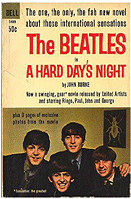
By this time grandfather has managed to get Norm and Shake at each other’s throats and Paul warns the others that this could only be the beginning. Sure enough, Grandfather has started a campaign of dissention that leads to frightening schoolgirls, a proposal of marriage to a chance acquaintance and general chaos culminating with Grandfather being locked in the luggage van where he and the boys complete their journey making music (to the sound of ‘I Should Have Known Better’).
When the boys arrive in London, they go to their hotel, where Norm leaves them to sort out their fan mail. However, Grandfather has noticed that a certain amount of good-humoured banter is directed at Ringo. Here, thinks Grandfather, is the weak link in the chain. Instead of staying in the hotel the four boys sneak out to enjoy themselves at a twist club and Grandfather, trading his clothes for a waiter’s suit, heads straight for a gambling club, passing himself off as Lord John McCartney. Again the boys have to rescue him, much to the old man’s indignation.
The following day sees the boys plunged into the bustle of the television world. Press conferences, rehearsals (they perform ‘If I Fell’), make-up, running from place to place, being shepherded by the harassed Norm and got at by the television show’s neurotic director, and always in the background is Grandfather, interfering, disrupting and needling Ringo.
When the boys arrive in London, they go to their hotel, where Norm leaves them to sort out their fan mail. However, Grandfather has noticed that a certain amount of good-humoured banter is directed at Ringo. Here, thinks Grandfather, is the weak link in the chain. Instead of staying in the hotel the four boys sneak out to enjoy themselves at a twist club and Grandfather, trading his clothes for a waiter’s suit, heads straight for a gambling club, passing himself off as Lord John McCartney. Again the boys have to rescue him, much to the old man’s indignation.
The following day sees the boys plunged into the bustle of the television world. Press conferences, rehearsals (they perform ‘If I Fell’), make-up, running from place to place, being shepherded by the harassed Norm and got at by the television show’s neurotic director, and always in the background is Grandfather, interfering, disrupting and needling Ringo.
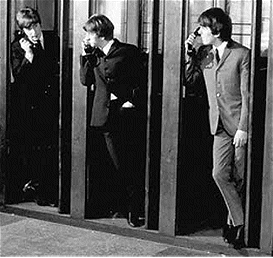
| The Beatles' music obviously played a major part in the film and it was introduced in a refreshingly natural way, unlike the forced musical breaks in so many pop music films. The movie featured ‘A Hard Day’s Night’, ‘I Should Have Known Better’, ‘If I Fell’, ‘I’m Happy Just To Dance with You’, ‘And I Love Her’, ‘Tell Me Why’, ‘Can’t Buy Me Love’, ‘Any Time At All’, ‘I’ll Cry Instead’, ‘Things We Said Today’, ‘When I get Home’, ‘You Can’t Do That’ and ‘I’ll Be Back.’ The film was given a Royal World Premiere at the London Pavilion before HRH Princess Margaret and the Earl of Snowdon to aid the Dockland Settlements and the Variety Club Heart Fund on Monday 6th July 1964 at 8.30 pm. Piccadilly Circus had to be closed to traffic as there were literally thousands of fans crowding the area. After the show the group went on to supper at the Dorchester Hotel. The northern premier took place in Liverpool on 10th July at the Odeon Cinema, following a civic reception at the town hall. The film then went on general release in Britain on 2nd August. |
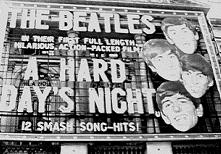
It was premiered in America at the Beacon Theatre in New York on 12th August and opened in 500 cinemas throughout the country the next day. Both British and American critics were, in the main, captivated by the film. A most quotable comment came from Andrew Sarris of the American magazine 'Village Voice' who described the film as ‘the ‘Citizen Kane’ of jukebox movies’. ‘A Hard Day’s Night’ proved to be an international success, bringing in almost $14 million on its initial release. There were various foreign language versions: in Italy it was known as ‘Tutti Per Uno’, in Germany as ‘Yeah Yeah Yeah die Beatles,’ in France as ‘Quatre Garcons dans le Vent’ and in Holland as ‘Yeah Yeah Yeah Daar de Beatles’.

Nice article! Lots of great music in that film.
ReplyDelete